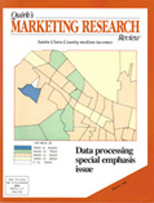Joseph Curry is a vice president of Sawtooth Software, a company that writes and markets microcomputer software for marketing research. Previously, he was research director at Future Computing, a marketing research company specializing in the personal computer industry. Since 1978, Curry has been involved in the development of microcomputer software systems for interactive interviewing and data analysis.
These days, you can't read a marketing trade publication without encountering ads for research software - cross-tabs, statistical packages, focus group databases and interviewing software packages. The software publishers are telling you that "everyone's doing it" and urging you to take the plunge.
Don't panic and rush to buy. The right software can do the things the advertisers tout: increase productivity, accuracy and cut costs. The wrong software, however, will not.
Marketing research software is expensive and to a far greater extent than word processing and database packages, it is your business. Its purchase should be carefully considered. Here are my suggestions for taking the risk out of buying software:
Learn what's available: In the past this wasn't easy. The main source of software information was the major PC publications that, except for an occasional statistical package review, didn't cover marketing research software. Today there are a number of publications that list software of interest to marketing researchers. Here are some of them:
- Directory of Software for Marketing and Marketing Research (AMA Marketing News)
- PC Software for Marketing and Sales (Gordon Publications)
- PC Week's Buyers Guide to Statistical Software
- Quirk's Marketing Research Review
- The Directory of Statistical Software (Marcel/Dekker)
- The Marketing Services Guide (AMA)
Other sources include: conferences (and exhibits) sponsored by the American Marketing Assn., the Marketing Research Assn., the American Statistical Assn., the American Sociological Assn., the Advertising Research Foundation and seminars offered by local colleges and universities.
Read reviews: Here's a list of publications that regularly review software related to marketing research:
- American Statistician
- Journal of Marketing Research
- Marketing News
- OR/MS Today
- PC Week
- Public Opinion Quarterly
- Social Science Microcomputer Review
Call and ask the software publisher where his package has been reviewed. Reviews can give you information about a specific package, as well as help you develop your own evaluation criteria.
Two words of caution regarding re-views: First, the rating a reviewer gives a package depends on the criteria he uses. These may not be the same ones that are important to you. Second, reviews are dated. Software publishers generally release updates that correct problems noted by reviewers. If a review points out a problem that is important to you, check with the soft-ware publisher to see if it has been corrected.
Send for information: Contact the software publisher for product literature and ask for a demonstration disk. If you have to pay for the disk, by sure that it is a working demonstration of the package and not just a "self-running slide show." Most publishers apply the price of the demo disk to the purchase of the package or, in some cases, refund your money if you return the disk. In any event, the price of a well-written demo is money well spent.
Collect information on several packages. Software publishers emphasize a product's strengths and so their literature is naturally biased. You can get a more balanced picture by collecting information from several publishers.
Call the software publisher with specific questions: Think through how you will use the software, define your needs and how they would be affected by the package's limits. Identify the specific requirements you have that aren't addressed in the publisher's literature, then call the software publisher and ask about these requirements. Stick to factual questions such as "Is the package copy protected?" or "Is there a money back guarantee?" Avoid asking the software publisher his opinion about his package.
Talk to users: Once you have narrowed your choice to two or three packages, talk to users you know or ask the publisher to give you the names of people, similar to yourself, who are using the software. This is your best source of information. Ask users:
- How well does the package do the job? What, if any, are the major limitations?
- Is the software easy to use? Is the documentation well organized, clear and accurate? What level of computer knowledge is necessary?
- Does the software have serious bugs? If so, has the publisher acknowledged them? How quickly have past bugs been fixed? What is the policy about distributing fixes?
- Is the software updated? How often are new features added? Are user suggestions incorporated in the upgrades? What is the charge for upgrades?
- What is the maintenance and support policy? How much does it cost? How quickly are support problems handled? Are the support people knowledgeable and helpful?
Also, ask users about specific requirements that are critical to you. If a demo disk is not available, arrange to have a user show you the package in operation.
Customer support is probably the most important issue, second only to the package being well-written. The "period of adjustment" and "learning curve" for software is often underestimated by both the software publisher and the user. Be sure the software publisher is committed to maintaining and updating his products. Make sure there are support staff who not only understand the software, but who understand marketing research, too.
You can take the risk out of buying software with a little homework; it takes time but the rewards are great. You may want to hire a computer consultant to do this work for you. If you do, be sure the consultant understands the research business and how the software will become an integral part of your business.
Today's software brings power and added expertise to the non-computer expert. That's why it is generating so much attention. With the right software you can expand your business and make it more productive.
